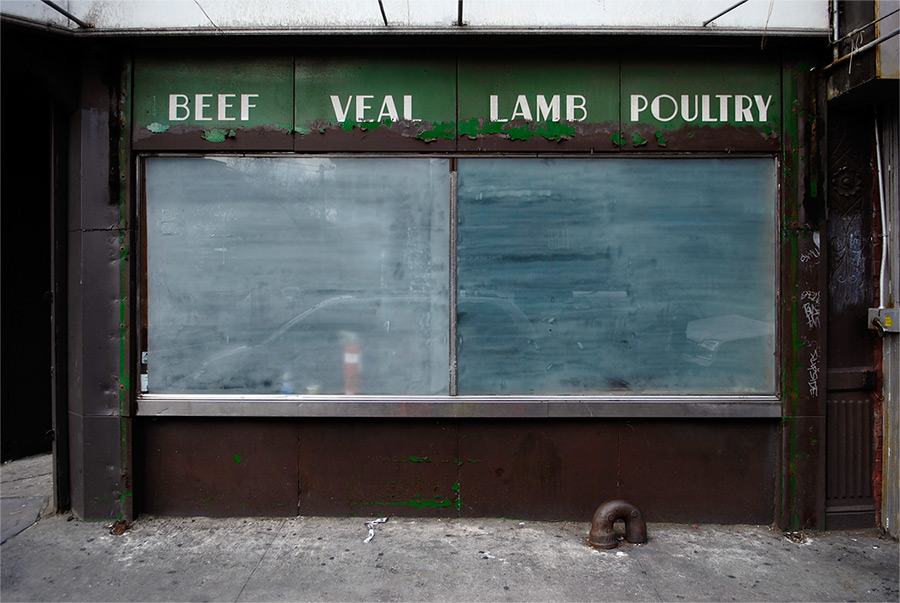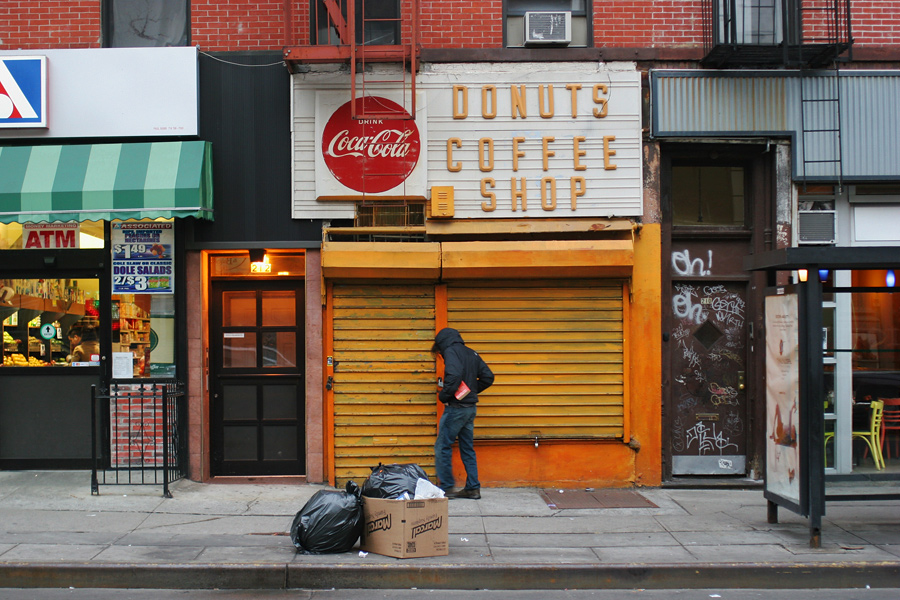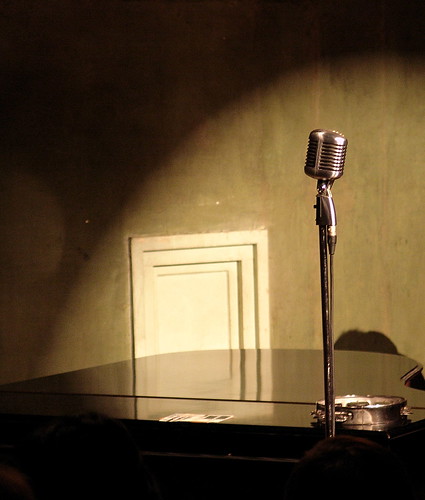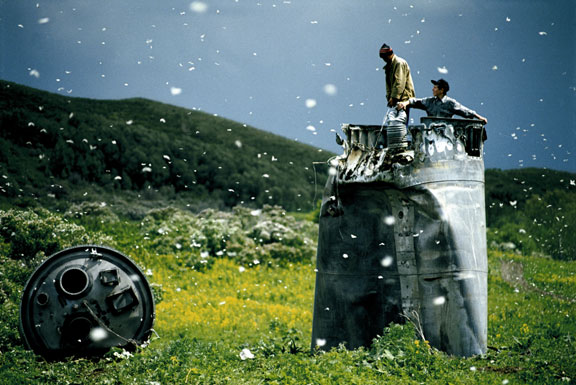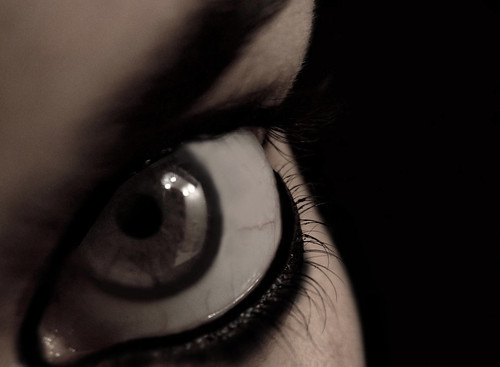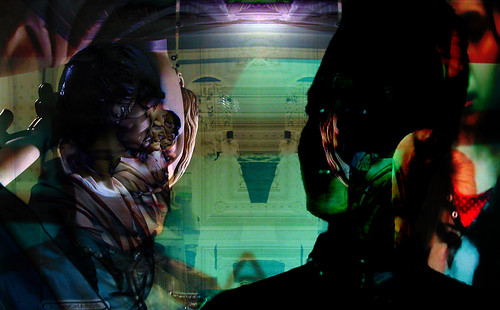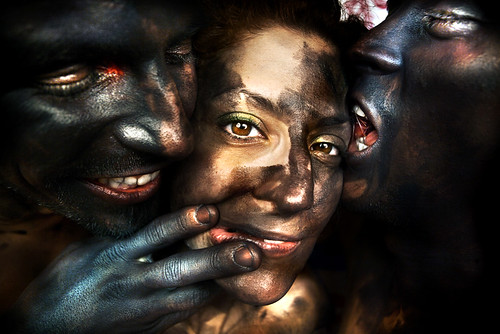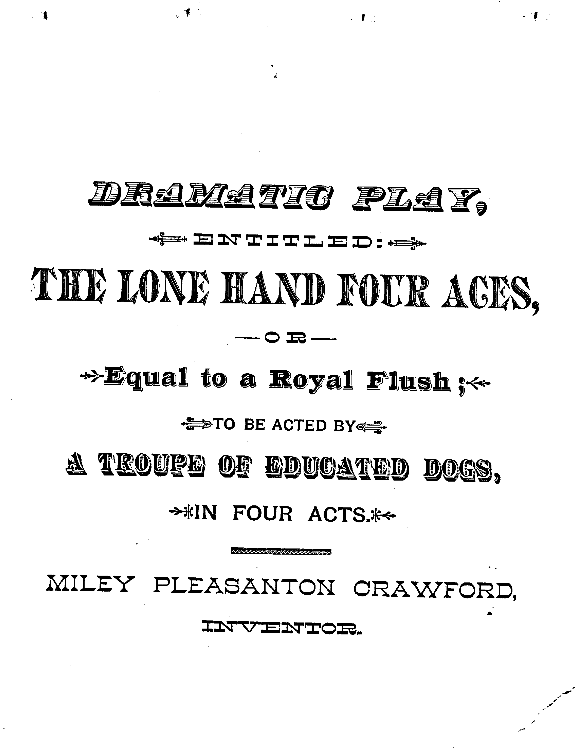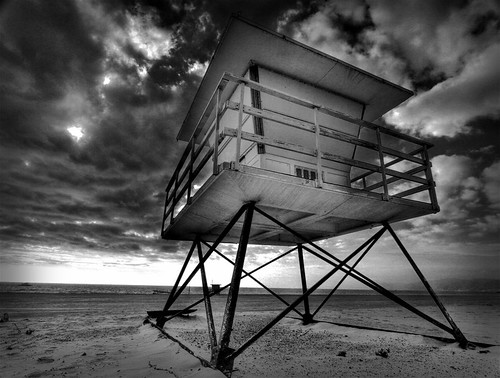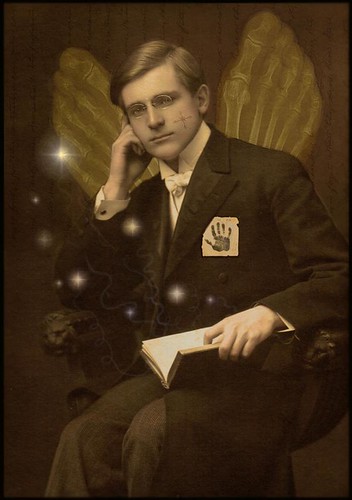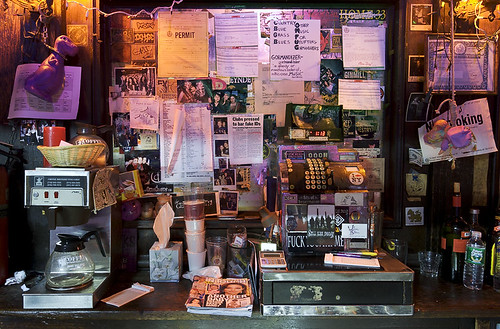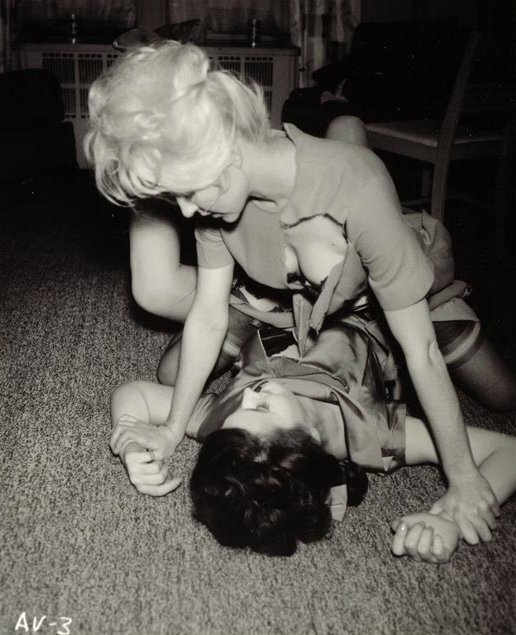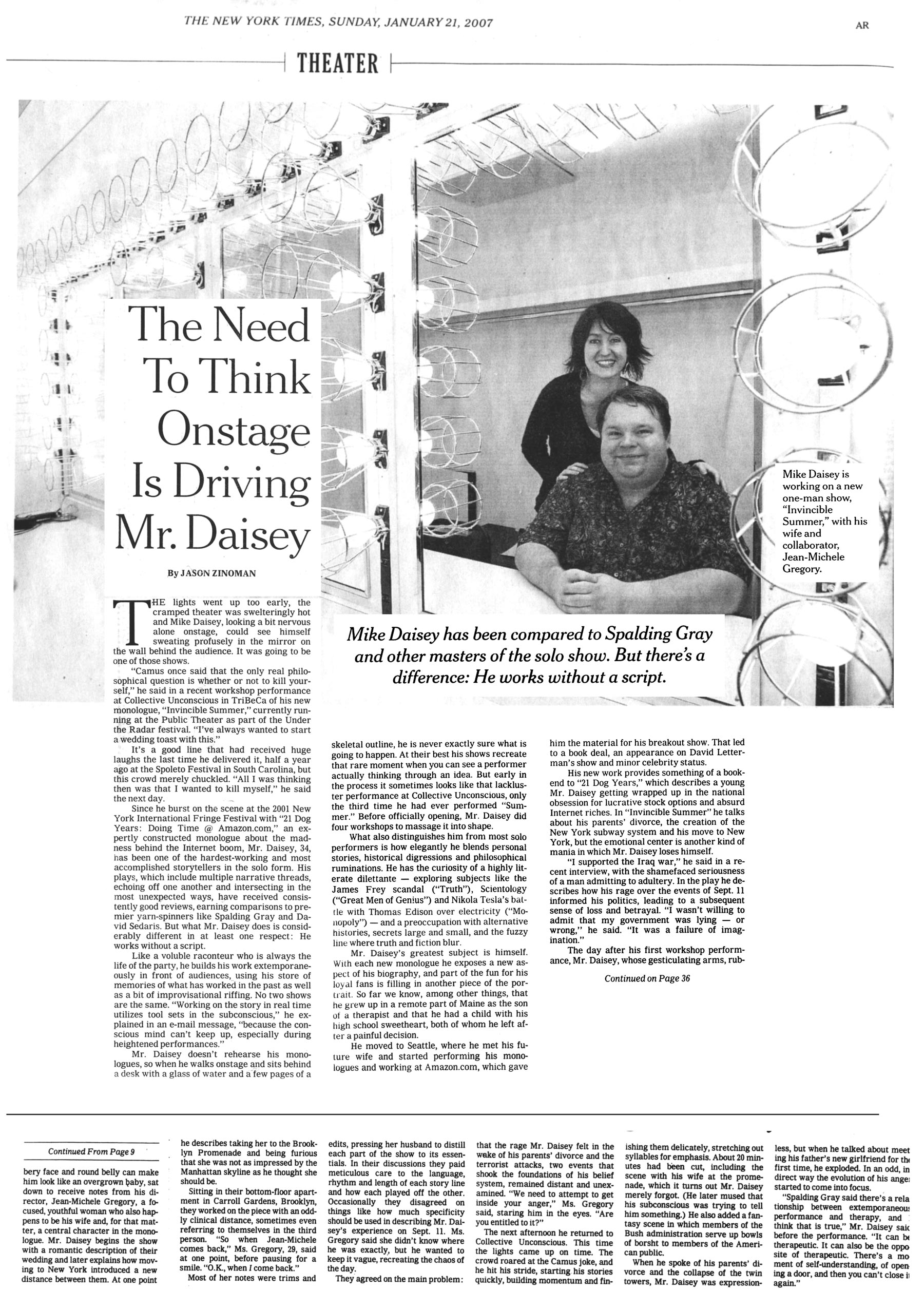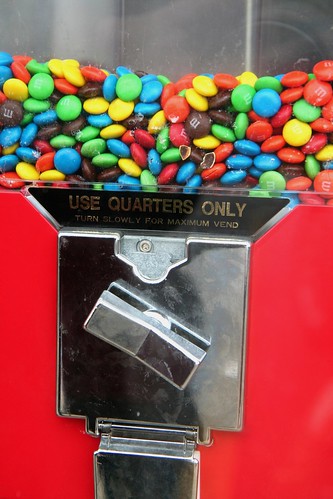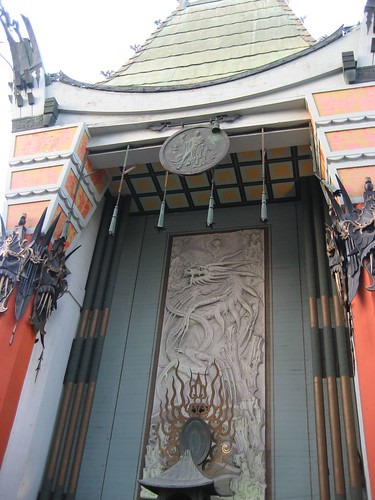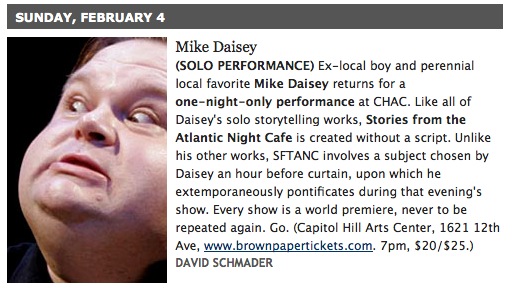
Wednesday, January 31, 2007
Longenbaugh on Theatre: Off the Chain (Seattle Weekly)
Longenbaugh on Theatre: Off the Chain (Seattle Weekly):
When I first met Mike Daisey in 1998, he gave me a lap dance. It wasn't a pleasant experience.
I'm pretty sure he didn't realize I was a reviewer, there to critique his first solo show in Seattle, Wasting Your Breath; he was just picking some poor sucker in the audience to writhe his considerable frame against as he recalled an unfortunate moment during the cross-country road trip that took him from a pregnant girlfriend on the East Coast to a new life in Seattle.
But I don't think it would have slowed him down even if he had known. Daisey's outstanding quality as a performer is his fearlessness, as demonstrated by Stories From the Atlantic Night Cafe, which he's bringing to Seattle for one night only at the Capitol Hill Arts Center on Sunday, Feb. 4. It takes guts to do a solo show. But it takes a deep foolhardiness to draw up an outline for a story only an hour before curtain, then use that as the guideline for an evening of extemporaneous entertainment.
When I first met Mike Daisey in 1998, he gave me a lap dance. It wasn't a pleasant experience.
I'm pretty sure he didn't realize I was a reviewer, there to critique his first solo show in Seattle, Wasting Your Breath; he was just picking some poor sucker in the audience to writhe his considerable frame against as he recalled an unfortunate moment during the cross-country road trip that took him from a pregnant girlfriend on the East Coast to a new life in Seattle.
But I don't think it would have slowed him down even if he had known. Daisey's outstanding quality as a performer is his fearlessness, as demonstrated by Stories From the Atlantic Night Cafe, which he's bringing to Seattle for one night only at the Capitol Hill Arts Center on Sunday, Feb. 4. It takes guts to do a solo show. But it takes a deep foolhardiness to draw up an outline for a story only an hour before curtain, then use that as the guideline for an evening of extemporaneous entertainment.
Tuesday, January 30, 2007
tiny nibbles - violet blue
tiny nibbles - violet blue:
I am friends with many pornographers and porn stars; they often want me to blog about their newest movies, etc. Late last year I said, sure, I like the video, can I have some still images for a blog post? They sent them in a FedEx pack of disks. Included was the 2257 CD -- and on it were scans and photos of each performer's state ID (or passport), Social Security cards (often held in a photo next to their faces), and forms including their real names and real addresses. I became the proud owner of everything someone would ever need to steal their identities, stalk and harass, blackmail, whatever. It freaked me the fuck out to even have that in my house. And the performers have no idea I have that -- they probably have no idea how many people have access to their personal information under this bizarrely executed law. But hey -- think the DoJ cares about what happens to porn stars? Most vulnerable, of course are female performers -- when 2257 went into effect, performer Kami Andrews got a pile of fan mail at her home and a few lurkers in her driveway. Can't they come up with a better way of "protecting the children"?
I am friends with many pornographers and porn stars; they often want me to blog about their newest movies, etc. Late last year I said, sure, I like the video, can I have some still images for a blog post? They sent them in a FedEx pack of disks. Included was the 2257 CD -- and on it were scans and photos of each performer's state ID (or passport), Social Security cards (often held in a photo next to their faces), and forms including their real names and real addresses. I became the proud owner of everything someone would ever need to steal their identities, stalk and harass, blackmail, whatever. It freaked me the fuck out to even have that in my house. And the performers have no idea I have that -- they probably have no idea how many people have access to their personal information under this bizarrely executed law. But hey -- think the DoJ cares about what happens to porn stars? Most vulnerable, of course are female performers -- when 2257 went into effect, performer Kami Andrews got a pile of fan mail at her home and a few lurkers in her driveway. Can't they come up with a better way of "protecting the children"?
Monday, January 29, 2007
The Believer - Interview with Todd Solondz
The Believer - Interview with Todd Solondz:
TS: Yes, but that’s different from liking comedies. All I mean is, I’m not the kind of audience comedy directors want at a test screening because I seldom laugh, and if I do, it’s not very loud. That doesn’t mean I don’t like the movie. On the other hand, when it comes to violence, I can be a bit too audible. When I was making Storytelling, I couldn’t watch while the violent sex scene between the student and the professor was being shot. It was too intense.
SN: Well, we here in America didn’t get to watch it either, of course, because it was blocked by that famous red rectangle. But in the end you weren’t entirely displeased with that, right?
TS: Well, needless to say, I would have preferred the scene to be shown untouched. But I was not entirely displeased with the block for a very specific reason. In the contract, I had stated that I would not cut anything or change any lines in order to get an R rating. I would agree only to boxes and bleeps. As a result, what the audience sees in my movie is a pure example of censorship. Usually the audience has no idea that the censored version of whatever movie they’re watching isn’t the original. Storytelling is the only studio movie where the censorship is perfectly clear, the only studio movie with a big red box covering up a shot. I take pride in that—and, of course, in having avoided the fate of Eyes Wide Shut.
Notice, by the way, how nobody uses the word censorship. Instead, everyone talks about “the rating system.” But most Americans have no idea how abridged the work they end up seeing on screen really is, how different from what the director originally intended. With Storytelling, at least, it’s explicit: this is what the censors say American citizens, no matter what age, are not permitted to see, even though it can be seen by other people all over the world. I suppose you could call it a political statement.
TS: Yes, but that’s different from liking comedies. All I mean is, I’m not the kind of audience comedy directors want at a test screening because I seldom laugh, and if I do, it’s not very loud. That doesn’t mean I don’t like the movie. On the other hand, when it comes to violence, I can be a bit too audible. When I was making Storytelling, I couldn’t watch while the violent sex scene between the student and the professor was being shot. It was too intense.
SN: Well, we here in America didn’t get to watch it either, of course, because it was blocked by that famous red rectangle. But in the end you weren’t entirely displeased with that, right?
TS: Well, needless to say, I would have preferred the scene to be shown untouched. But I was not entirely displeased with the block for a very specific reason. In the contract, I had stated that I would not cut anything or change any lines in order to get an R rating. I would agree only to boxes and bleeps. As a result, what the audience sees in my movie is a pure example of censorship. Usually the audience has no idea that the censored version of whatever movie they’re watching isn’t the original. Storytelling is the only studio movie where the censorship is perfectly clear, the only studio movie with a big red box covering up a shot. I take pride in that—and, of course, in having avoided the fate of Eyes Wide Shut.
Notice, by the way, how nobody uses the word censorship. Instead, everyone talks about “the rating system.” But most Americans have no idea how abridged the work they end up seeing on screen really is, how different from what the director originally intended. With Storytelling, at least, it’s explicit: this is what the censors say American citizens, no matter what age, are not permitted to see, even though it can be seen by other people all over the world. I suppose you could call it a political statement.
Sunday, January 28, 2007
China censorship damaged us, Google founders admit | Business | Guardian Unlimited Business
China censorship damaged us, Google founders admit | Business | Guardian Unlimited Business:
Google's decision to censor its search engine in China was bad for the company, its founders admitted yesterday.
Google, launched in 1998 by two Stanford University dropouts, Sergey Brin and Larry Page, was accused of selling out and reneging on its "Don't be evil" motto when it launched in China in 2005. The company modified the version of its search engine in China to exclude controversial topics such as the Tiananmen Square massacre or the Falun Gong movement, provoking a backlash in its core western markets.
Google's decision to censor its search engine in China was bad for the company, its founders admitted yesterday.
Google, launched in 1998 by two Stanford University dropouts, Sergey Brin and Larry Page, was accused of selling out and reneging on its "Don't be evil" motto when it launched in China in 2005. The company modified the version of its search engine in China to exclude controversial topics such as the Tiananmen Square massacre or the Falun Gong movement, provoking a backlash in its core western markets.
Where Work Is a Religion, Work Burnout Is Its Crisis of Faith -- New York Magazine
Where Work Is a Religion, Work Burnout Is Its Crisis of Faith -- New York Magazine:
People who are suffering from burnout tend to describe the sensation in metaphors of emptiness—they’re a dry teapot over a high flame, a drained battery that can no longer hold its charge. Thirteen years, three books, and dozens of papers into his profession, Barry Farber, a professor at Columbia Teachers College and trained psychotherapist, realized he was feeling this way. Unfortunately, he was well acquainted with the symptoms. He was a burnout researcher himself.
Being burned out on burnout—now that was rich. Madame Curie died of radiation poisoning; Joseph Mitchell famously developed a 32-year-long case of writer’s block after writing a two-part New Yorker series about a blocked writer; now Farber was suffering the same self-referential fate. He jokes about it today (who wouldn’t?) but hardly felt sanguine as it was happening (who would?). Colleagues tried to persuade him to stick it out. “But for the most part, I’ve resisted coming back,” says Farber. “I’ve never been able to find that same sense of satisfaction.”
People who are suffering from burnout tend to describe the sensation in metaphors of emptiness—they’re a dry teapot over a high flame, a drained battery that can no longer hold its charge. Thirteen years, three books, and dozens of papers into his profession, Barry Farber, a professor at Columbia Teachers College and trained psychotherapist, realized he was feeling this way. Unfortunately, he was well acquainted with the symptoms. He was a burnout researcher himself.
Being burned out on burnout—now that was rich. Madame Curie died of radiation poisoning; Joseph Mitchell famously developed a 32-year-long case of writer’s block after writing a two-part New Yorker series about a blocked writer; now Farber was suffering the same self-referential fate. He jokes about it today (who wouldn’t?) but hardly felt sanguine as it was happening (who would?). Colleagues tried to persuade him to stick it out. “But for the most part, I’ve resisted coming back,” says Farber. “I’ve never been able to find that same sense of satisfaction.”
Friday, January 26, 2007
Izzle! Izzle pfaff!
Cheney Shoots You In The Face :
EVERYWHERE, Jan. 25, 2007--For the second time in one year, Vice President Dick Cheney was involved in a gun-related incident once again after shooting you in the face with a shotgun earlier today.
Reportedly enraged with the media and public reaction to President Bush's recent State of the Union address, which was described as "imbecilic", "insulting" and "full of tainted meat" by its nine viewers, Cheney embarked on an ambitious project to shoot every American in the face, including you.
EVERYWHERE, Jan. 25, 2007--For the second time in one year, Vice President Dick Cheney was involved in a gun-related incident once again after shooting you in the face with a shotgun earlier today.
Reportedly enraged with the media and public reaction to President Bush's recent State of the Union address, which was described as "imbecilic", "insulting" and "full of tainted meat" by its nine viewers, Cheney embarked on an ambitious project to shoot every American in the face, including you.
Say Hello To Alpha Kitty
Say Hello To Alpha Kitty:
"What I want to do is gather my tribe"—yes, Rubenstein actually says things like this—"the ones reading Seventeen, and the ones who were, and grew out of it." This tribe is 13 to 30, female, thoroughly digital, and, in Rubenstein's view, lacking an "alpha kitty" addressing their concerns and sensibility. What she brings is her big-sister, geek-gone-glam persona. She honed this act editing Seventeen and teen title CosmoGIRL, and now shows it in full plumage in her MySpace blog entries, which are a riot of excessive capitalization and estrogenic display. The ultimate shape of Atoosa Inc. is inchoate, but Rubenstein is certain of one thing. "The next Oprah will not be born on TV," she says. "I left to launch my brand."
These days Rubenstein's parent company is her own Big Momma Productions, which explains the enormous ring that emblazons "big momma" across three fingers, (a gift from her husband, she explains). In a meeting, she says about her audience, without apparent irony: "They are unborn to me, but they're mine." Still, her sense of ownership and her furiously fashionista exterior is often punctured by glimpses of the homespun and deeply idiosyncratic. At a meeting with potential investors she skips PowerPoint in favor of construction paper decorated, grade school project-style, with a crazy-quilt of colored pencil notations. Her first offering may be what she terms her "art project," Psychic Kitty, a series of psychedelicized videos on her MySpace page. They will star her cat Thurston spouting, in Rubenstein's electronically processed voice, brief inspirational tidbits. Rubenstein calls Psychic Kitty "the cat in the family," and she's mum on a debut date: "You know how it is with cats."
"What I want to do is gather my tribe"—yes, Rubenstein actually says things like this—"the ones reading Seventeen, and the ones who were, and grew out of it." This tribe is 13 to 30, female, thoroughly digital, and, in Rubenstein's view, lacking an "alpha kitty" addressing their concerns and sensibility. What she brings is her big-sister, geek-gone-glam persona. She honed this act editing Seventeen and teen title CosmoGIRL, and now shows it in full plumage in her MySpace blog entries, which are a riot of excessive capitalization and estrogenic display. The ultimate shape of Atoosa Inc. is inchoate, but Rubenstein is certain of one thing. "The next Oprah will not be born on TV," she says. "I left to launch my brand."
These days Rubenstein's parent company is her own Big Momma Productions, which explains the enormous ring that emblazons "big momma" across three fingers, (a gift from her husband, she explains). In a meeting, she says about her audience, without apparent irony: "They are unborn to me, but they're mine." Still, her sense of ownership and her furiously fashionista exterior is often punctured by glimpses of the homespun and deeply idiosyncratic. At a meeting with potential investors she skips PowerPoint in favor of construction paper decorated, grade school project-style, with a crazy-quilt of colored pencil notations. Her first offering may be what she terms her "art project," Psychic Kitty, a series of psychedelicized videos on her MySpace page. They will star her cat Thurston spouting, in Rubenstein's electronically processed voice, brief inspirational tidbits. Rubenstein calls Psychic Kitty "the cat in the family," and she's mum on a debut date: "You know how it is with cats."
Mike Daisey’s life before wartime
Mike Daisey’s life before wartime:
Mike Daisey has a gigantic head. In his new one-man show at the Public Theater, his expressive face, glowing baby pink or flamingo red, mirrors his explosion of ideas on everything from the sensation of his wife in his arms to the “ecstatic dirtiness” of the New York City subway system. Playing this week as part of the Under the Radar festival of new theater, “Invincible Summer” is ostensibly about Daisey’s life during the summer before September 11, 2001, but it also includes digressions about the dreams of cities, Polish wedding toasts, and the history of the MTA to create a story that is bigger, messier, and far more rewarding than mere autobiography.
Half the fun of Mike Daisey is watching him spin out a tangle of ideas and wondering how he’ll lasso them into a coherent story. He works from an outline, not a script, and he free-forms the words in each performance, a method that gives him the loose spontaneity of great standup and the kinetic force to fill a room as large as the Public Theater.
Mike Daisey has a gigantic head. In his new one-man show at the Public Theater, his expressive face, glowing baby pink or flamingo red, mirrors his explosion of ideas on everything from the sensation of his wife in his arms to the “ecstatic dirtiness” of the New York City subway system. Playing this week as part of the Under the Radar festival of new theater, “Invincible Summer” is ostensibly about Daisey’s life during the summer before September 11, 2001, but it also includes digressions about the dreams of cities, Polish wedding toasts, and the history of the MTA to create a story that is bigger, messier, and far more rewarding than mere autobiography.
Half the fun of Mike Daisey is watching him spin out a tangle of ideas and wondering how he’ll lasso them into a coherent story. He works from an outline, not a script, and he free-forms the words in each performance, a method that gives him the loose spontaneity of great standup and the kinetic force to fill a room as large as the Public Theater.
Invincible Summer
Invincible Summer: nytheatre.com:
Armed with only a table and a chair, a glass of water, and a few sheets of paper, monologist/solo performer Mike Daisey takes the audience on a funny and profound journey in his extraordinary new show, Invincible Summer. The title refers to an Albert Camus quote about discovering the invincible summer in oneself, but just as easily applies to the rich tapestry of events that occur one particular summer and shake the author to his core.
Armed with only a table and a chair, a glass of water, and a few sheets of paper, monologist/solo performer Mike Daisey takes the audience on a funny and profound journey in his extraordinary new show, Invincible Summer. The title refers to an Albert Camus quote about discovering the invincible summer in oneself, but just as easily applies to the rich tapestry of events that occur one particular summer and shake the author to his core.
Thursday, January 25, 2007
Mr. Excitement News: Panel Report-Out: Changing Mindsets
Mr. Excitement News: Panel Report-Out: Changing Mindsets:
Richard Nelson, whose missive on "the damage this culture of 'development' has done and continues to do to my profession" ignited a dialogue that continues to reverberate throughout the blogosphere, called playwriting “a glorious and wonderful profession” that “supported myself and my family”. Over his 30-year career, Nelson said he’s seen the profession “come under siege” and the role of the playwright questioned in “unfortunate” ways. Development “implies that something outside of ourselves is going to tell us what to do.” Nelson railed against “this terrible word called ‘text’”, which is employed, he said, to “push the playwright aside.” In fact, he said, “Words are only an indication of the play that I have written.”
Morgan Jenness, the dramaturg on the panel, agreed with Nelson’s assessment of the situation. “I totally agree”, she said, offering that “the way the institutions are structured” was to blame. Something has happened “across the board” in the regional theaters, she said. Previously (Jenness worked for Joe Papp at the Public), there was a “core attitude that everyone in the institution was responsive to the work”, but “now it really feels like the institutions are these factories”, lacking “real dialogue with the audience”. Also, “Institutional artists are not honest with themselves about their prejudices or desires.”
Following the money trail is one way to assess what’s happened, Nelson said. Over the course of his career, he’s seen the new play move from the mainstage to the second stage and now into non-production situations. 13P and SPF are the way to go, he said. “Pure production for young emerging writers. It is the answer.”
Richard Nelson, whose missive on "the damage this culture of 'development' has done and continues to do to my profession" ignited a dialogue that continues to reverberate throughout the blogosphere, called playwriting “a glorious and wonderful profession” that “supported myself and my family”. Over his 30-year career, Nelson said he’s seen the profession “come under siege” and the role of the playwright questioned in “unfortunate” ways. Development “implies that something outside of ourselves is going to tell us what to do.” Nelson railed against “this terrible word called ‘text’”, which is employed, he said, to “push the playwright aside.” In fact, he said, “Words are only an indication of the play that I have written.”
Morgan Jenness, the dramaturg on the panel, agreed with Nelson’s assessment of the situation. “I totally agree”, she said, offering that “the way the institutions are structured” was to blame. Something has happened “across the board” in the regional theaters, she said. Previously (Jenness worked for Joe Papp at the Public), there was a “core attitude that everyone in the institution was responsive to the work”, but “now it really feels like the institutions are these factories”, lacking “real dialogue with the audience”. Also, “Institutional artists are not honest with themselves about their prejudices or desires.”
Following the money trail is one way to assess what’s happened, Nelson said. Over the course of his career, he’s seen the new play move from the mainstage to the second stage and now into non-production situations. 13P and SPF are the way to go, he said. “Pure production for young emerging writers. It is the answer.”
Wired 15.02: Posts
A piece I did for WIRED Magazine on Peter Weller is up on the web:
RoboCop, PhD:
THE CELEBRITY SECOND ACT HAS BECOME a staple of pop culture. The press releases almost write themselves: Comedian becomes reality TV host, reality TV host becomes actor, actor releases mediocre rap album. But those second acts don’t always sink to the level of cliché. Take Peter Weller. He’s had a long, meandering Act I. After a vibrant movie career in the 1980s that included playing the lead in cult hits like RoboCop, he fell into the far less glamorous world of direct-to-video and straight-to-cable. Then last year, he came back big, in a riveting turn as a bad guy on 24.
In the interim, though, Weller started getting into character for Act II. He spent much of the past two decades in Italy and, on a lark, enrolled in classes at the Syracuse University program in Florence. He soon discovered he had a thing for the aqueducts of long-dead civilizations, and now he’s working toward a PhD in Italian Renaissance art history from UCLA. This is no vanity degree; Weller teaches courses, writes papers, and is doggedly climbing the academic ladder. Buckaroo Banzai, the polymath who was arguably Weller’s most famous character — acclaimed neurosurgeon, race car driver, particle physicist, and, of course, rock star — would be proud. “I’ve always followed my passions,” Weller says, “even when it didn’t seem to make much sense.”
RoboCop, PhD:
THE CELEBRITY SECOND ACT HAS BECOME a staple of pop culture. The press releases almost write themselves: Comedian becomes reality TV host, reality TV host becomes actor, actor releases mediocre rap album. But those second acts don’t always sink to the level of cliché. Take Peter Weller. He’s had a long, meandering Act I. After a vibrant movie career in the 1980s that included playing the lead in cult hits like RoboCop, he fell into the far less glamorous world of direct-to-video and straight-to-cable. Then last year, he came back big, in a riveting turn as a bad guy on 24.
In the interim, though, Weller started getting into character for Act II. He spent much of the past two decades in Italy and, on a lark, enrolled in classes at the Syracuse University program in Florence. He soon discovered he had a thing for the aqueducts of long-dead civilizations, and now he’s working toward a PhD in Italian Renaissance art history from UCLA. This is no vanity degree; Weller teaches courses, writes papers, and is doggedly climbing the academic ladder. Buckaroo Banzai, the polymath who was arguably Weller’s most famous character — acclaimed neurosurgeon, race car driver, particle physicist, and, of course, rock star — would be proud. “I’ve always followed my passions,” Weller says, “even when it didn’t seem to make much sense.”
Wednesday, January 24, 2007
Bog Face: Cathedral
Bog Face: Cathedral:
When I was in Moscow this summer my sister-in-law was eating what I would refer to as a honeydew melon for dinner and when I asked her what it was called she said "dyinya" - which just means melon. There's nothing for the honey dew part. This ended up causing some tension between us because the "y" in that first syllable represents a horrible vowel called a "Yery" and after all these years of trying I still can't fucking make this sound correctly - even though it's all over the Russian language. So she kept saying "dyinya" and I kept saying "dyinya" and she kept saying NO! NO! DYINYA! and so on. And then I wore black to her wedding. The yery is a "close, central unrounded vowel" which means you pretend like your throat is closing up after a deadly allergic reaction to say a bee sting, and then, with your throat in that position, you try to make the sound "ee." Even though I'm an actor, it takes me a really long time to imagine the bee sting part and by then everyone has moved on they don't care about me anymore.
What's weird about the "close, central unrounded vowel" is that it's rare in Indo-European languages - mainly it's used in Polish, Russian, and Romanian - but it's used in almost all the indigenous languages of the Americas. They even think the Aztecs used it. So I guess that walking over ice thing or whatever is true.
Goodness I'm digressing.
When I was in Moscow this summer my sister-in-law was eating what I would refer to as a honeydew melon for dinner and when I asked her what it was called she said "dyinya" - which just means melon. There's nothing for the honey dew part. This ended up causing some tension between us because the "y" in that first syllable represents a horrible vowel called a "Yery" and after all these years of trying I still can't fucking make this sound correctly - even though it's all over the Russian language. So she kept saying "dyinya" and I kept saying "dyinya" and she kept saying NO! NO! DYINYA! and so on. And then I wore black to her wedding. The yery is a "close, central unrounded vowel" which means you pretend like your throat is closing up after a deadly allergic reaction to say a bee sting, and then, with your throat in that position, you try to make the sound "ee." Even though I'm an actor, it takes me a really long time to imagine the bee sting part and by then everyone has moved on they don't care about me anymore.
What's weird about the "close, central unrounded vowel" is that it's rare in Indo-European languages - mainly it's used in Polish, Russian, and Romanian - but it's used in almost all the indigenous languages of the Americas. They even think the Aztecs used it. So I guess that walking over ice thing or whatever is true.
Goodness I'm digressing.
Boing Boing: LACMA's Magritte exhibit: This is not fair use
Boing Boing: LACMA's Magritte exhibit: This is not fair use:
Inside, they've hung many of Magritte's famous works, and, accompanying these works, they've placed dozens of contemporary sculptures and paintings that riff off of Magritte, making fun of him or paying homage to him or commenting on him. These are canonical fair uses -- an artist who takes from another artist and uses his work to make new work. In these other works, from the likes of Warhol and Antin, there are instances of Magritte's work being duplicated in photos and paint.
So far so good -- there's a clear message from the paintings in the exhibit: culture is well-served by liberal rules that let one person remix another's creation.
But that message is undermined by the exhibition policy on photos: no photos are allowed in the exhibit. If you take out your camera, one of the bowler-hatted guards will come up to you and shout at you (literally shout at you!): "No photos allowed!" They won't even let you take out a phone or PDA and make notes with it, in case you're sneakily taking photos on the premises.
This is a riddle: does the Magritte exhibition celebrate fair use, or deny it? Does it want to inspire us to remix Magritte, or warn us off the idea of reproduction without permission?
Inside, they've hung many of Magritte's famous works, and, accompanying these works, they've placed dozens of contemporary sculptures and paintings that riff off of Magritte, making fun of him or paying homage to him or commenting on him. These are canonical fair uses -- an artist who takes from another artist and uses his work to make new work. In these other works, from the likes of Warhol and Antin, there are instances of Magritte's work being duplicated in photos and paint.
So far so good -- there's a clear message from the paintings in the exhibit: culture is well-served by liberal rules that let one person remix another's creation.
But that message is undermined by the exhibition policy on photos: no photos are allowed in the exhibit. If you take out your camera, one of the bowler-hatted guards will come up to you and shout at you (literally shout at you!): "No photos allowed!" They won't even let you take out a phone or PDA and make notes with it, in case you're sneakily taking photos on the premises.
This is a riddle: does the Magritte exhibition celebrate fair use, or deny it? Does it want to inspire us to remix Magritte, or warn us off the idea of reproduction without permission?
Schneier on Security: "Clear" Registered Traveller Program
Schneier on Security: "Clear" Registered Traveller Program:
The truth is that whenever you create two paths through security -- a high-security path and a low-security path -- you have to assume that the bad guys will find a way to exploit the low-security path. It may be counterintuitive, but we are all safer if the people chosen for more thorough screening are truly random and not based on an error-filled database or a cursory background check.
I think of Clear as a $100 service that tells terrorists if the F.B.I. is on to them or not. Why in the world would we provide terrorists with this ability?
We don’t have to. Clear cardholders are not scrutinized less when they go through checkpoints, they’re scrutinized more efficiently. So why not get rid of the background checks altogether? We should all be able to walk into the airport, pay $10, and use the Clear lanes when it’s worth it to us.
The truth is that whenever you create two paths through security -- a high-security path and a low-security path -- you have to assume that the bad guys will find a way to exploit the low-security path. It may be counterintuitive, but we are all safer if the people chosen for more thorough screening are truly random and not based on an error-filled database or a cursory background check.
I think of Clear as a $100 service that tells terrorists if the F.B.I. is on to them or not. Why in the world would we provide terrorists with this ability?
We don’t have to. Clear cardholders are not scrutinized less when they go through checkpoints, they’re scrutinized more efficiently. So why not get rid of the background checks altogether? We should all be able to walk into the airport, pay $10, and use the Clear lanes when it’s worth it to us.
Tuesday, January 23, 2007
Slashdot | US Attorney General Questions Habeas Corpus
Slashdot | US Attorney General Questions Habeas Corpus:
"In yet another attempt to create legitimacy for the Bush Administration's many questionable legal practices, US attorney General Alberto Gonzales actually had the audacity to argue before a Congressional committee that the US Constitution doesn't explicitly bestow habeas corpus rights on US citizens. In his view it merely says when the so-called Great Writ can be suspended, but that doesn't necessarily mean that the rights are granted. The Attorney General was being questioned by Sen. Arlen Specter at a Senate Judiciary Committee hearing on Jan. 18. THe MSM are not covering this story but Colbert is (click on the fourth video down, 'Exact Words')."
From the Baltimore Chronicle and Sentinel commentary:
"While Gonzales's statement has a measure of quibbling precision to it, his logic is troubling because it would suggest that many other fundamental rights that Americans hold dear (such as free speech, freedom of religion, and the right to assemble peacefully) also don't exist because the Constitution often spells out those rights in the negative. It boggles the mind the lengths this administration will go to to systematically erode the rights and privileges we have all counted on and held up as the granite pillars of our society since our nation was founded."
"In yet another attempt to create legitimacy for the Bush Administration's many questionable legal practices, US attorney General Alberto Gonzales actually had the audacity to argue before a Congressional committee that the US Constitution doesn't explicitly bestow habeas corpus rights on US citizens. In his view it merely says when the so-called Great Writ can be suspended, but that doesn't necessarily mean that the rights are granted. The Attorney General was being questioned by Sen. Arlen Specter at a Senate Judiciary Committee hearing on Jan. 18. THe MSM are not covering this story but Colbert is (click on the fourth video down, 'Exact Words')."
From the Baltimore Chronicle and Sentinel commentary:
"While Gonzales's statement has a measure of quibbling precision to it, his logic is troubling because it would suggest that many other fundamental rights that Americans hold dear (such as free speech, freedom of religion, and the right to assemble peacefully) also don't exist because the Constitution often spells out those rights in the negative. It boggles the mind the lengths this administration will go to to systematically erode the rights and privileges we have all counted on and held up as the granite pillars of our society since our nation was founded."
guide, map, tourist, neighborhood, poster, book
NOT FOR TOURISTS - Mike Daisey:
Google “monologuist” and appropriately the fifth entry that pops up is a mention of the late (and great) Spalding Gray. Well, look for a new name to be inching it’s way up the Google hierarchy very soon—Mike Daisey. To see what the buzz is about, go catch his new monologue Invincible Summer at the Public Theater as part of the Under the Radar Festival. I saw the show opening night and it was hilarious. And touching. And disturbing. His honest stories never revert to sappiness, and he keeps the pace brisk by jumping back and forth between various plotlines. He talks about some of the best things in life (Brooklyn, the subway, joyous weddings) to some of the worst (9/11, family betrayal, Paris Hilton).
Google “monologuist” and appropriately the fifth entry that pops up is a mention of the late (and great) Spalding Gray. Well, look for a new name to be inching it’s way up the Google hierarchy very soon—Mike Daisey. To see what the buzz is about, go catch his new monologue Invincible Summer at the Public Theater as part of the Under the Radar Festival. I saw the show opening night and it was hilarious. And touching. And disturbing. His honest stories never revert to sappiness, and he keeps the pace brisk by jumping back and forth between various plotlines. He talks about some of the best things in life (Brooklyn, the subway, joyous weddings) to some of the worst (9/11, family betrayal, Paris Hilton).
Under the Radar Festival: review on TheaterMania.com
Invincible Summer: review on TheaterMania.com:
He has a knack for detailed descriptions and keen observations that provoke laughter of recognition amongst his audience. His stories are often raucously funny, but the solo performer also probes more intense and painful subjects in a compelling manner. He captures the complex and contradictory feelings that many Americans had after 9/11 and isn't afraid of expressing some of his own less-than-politically-correct emotions.
He has a knack for detailed descriptions and keen observations that provoke laughter of recognition amongst his audience. His stories are often raucously funny, but the solo performer also probes more intense and painful subjects in a compelling manner. He captures the complex and contradictory feelings that many Americans had after 9/11 and isn't afraid of expressing some of his own less-than-politically-correct emotions.
KadmusArts - where culture speaks » Blog Archive » Interview: Mike Daisey
KadmusArts - where culture speaks » Blog Archive » Interview: Mike Daisey:
In this interview, Mike talks about the genesis of this latest work, how he develops the converging story lines, and what’s on the sheets of paper he brings on stage.
In this interview, Mike talks about the genesis of this latest work, how he develops the converging story lines, and what’s on the sheets of paper he brings on stage.
Sundance opens with call to speak out against war | US News |
Sundance opens with call to speak out against war | US News | Reuters.com:
Redford, whose Sundance Institute for independent film backs the annual festival, said in the aftermath of the September 11 attacks he, like many others, showed a "spirit of unity" with President George W. Bush and others who backed the war on terrorism and led invasions of Afghanistan and Iraq.
"We put all our concerns on hold to let the leaders lead," Redford told a packed audience for the opening night documentary film, "Chicago 10."
"I think we're owed a big, massive apology," he added.
Redford, whose Sundance Institute for independent film backs the annual festival, said in the aftermath of the September 11 attacks he, like many others, showed a "spirit of unity" with President George W. Bush and others who backed the war on terrorism and led invasions of Afghanistan and Iraq.
"We put all our concerns on hold to let the leaders lead," Redford told a packed audience for the opening night documentary film, "Chicago 10."
"I think we're owed a big, massive apology," he added.
Saturday, January 20, 2007
CitySpecific: Invincible Summer
CitySpecific: Invincible Summer:
I haven't seen a whole lot of monologues performed live, but Daisey's proved to me it can have all the drama of an ensemble piece. His narrative embraces weddings, Seattle, subways, the New York summer, one horribly memorable New York summer day, the Jersey shore, his parents' divorce, New York's obsession with itself (which prompts a very funny bit about Paris Hilton), and general existential dread (hence the Camus reference in the title). The work is paced like a great memoir should be.
I haven't seen a whole lot of monologues performed live, but Daisey's proved to me it can have all the drama of an ensemble piece. His narrative embraces weddings, Seattle, subways, the New York summer, one horribly memorable New York summer day, the Jersey shore, his parents' divorce, New York's obsession with itself (which prompts a very funny bit about Paris Hilton), and general existential dread (hence the Camus reference in the title). The work is paced like a great memoir should be.
olamina: don't go to bed angry...stay up and fight. OR this week's cultural event #1
olamina: don't go to bed angry...stay up and fight. OR this week's cultural event #1:
I'd seen Mike do a short monologue in the summer of 2005 at The Harlem Shakes' really great Pianos residency, but it was a rowdy night in a hot and sweaty nightclub. Not the right place to get into a riveting monologue. SO I was really glad to get the chance to see him again.
I'd seen Mike do a short monologue in the summer of 2005 at The Harlem Shakes' really great Pianos residency, but it was a rowdy night in a hot and sweaty nightclub. Not the right place to get into a riveting monologue. SO I was really glad to get the chance to see him again.
Thursday, January 18, 2007
Hello, APAP Conference Attendees and Under The Radar Symposium Participants!
Here are some quick links to INVINCIBLE SUMMER to make it easier for you to get around:
INVINCIBLE SUMMER performance times, description and ticket information.
An interview on Public Radio International's FAIR GAME about INVINCIBLE SUMMER.
A short biography about me and my work.
A comprehensive list of the monologues I perform, including reviews, features, excerpts and more.
The Public Theater is located at 425 Lafayette Street, and full directions may be found here.
I'll be coming out to the bar in the lobby after performances, and will be around the symposium on Thursday, the speed dating event on Friday, and all over the Public through the weekend--if you have trouble reaching me for any reason, simply send me an email.
Be seeing you,
md
Here are some quick links to INVINCIBLE SUMMER to make it easier for you to get around:
INVINCIBLE SUMMER performance times, description and ticket information.
An interview on Public Radio International's FAIR GAME about INVINCIBLE SUMMER.
A short biography about me and my work.
A comprehensive list of the monologues I perform, including reviews, features, excerpts and more.
The Public Theater is located at 425 Lafayette Street, and full directions may be found here.
I'll be coming out to the bar in the lobby after performances, and will be around the symposium on Thursday, the speed dating event on Friday, and all over the Public through the weekend--if you have trouble reaching me for any reason, simply send me an email.
Be seeing you,
md
Wednesday, January 17, 2007
He speaks the truth softly, at a show called Talkingstick
He speaks the truth softly, at a show called Talkingstick:
Known by his friends as William Lee, this tall, long-haired Chinese-American has been a fixture in the Village for 20 years. He started doing street shows in Washington Square Park when he was in college, first as a juggler, then as a kung-fu comic incorporating jokes, fire tricks, and martial arts. Thousands of NYU students, drug dealers, tourists, and neighborhood grifters undoubtedly remember his immortal words: “Ladies and gentlemen! I, Master Lee, will break this board” (dramatic pause) “with my HEAD. But first!”
For five years he did standup in comedy clubs, garnering spots on Late Night with Conan O’Brien and Showtime at the Apollo, but returned to street shows because they gave him a visceral jolt he couldn’t find anywhere else. Eventually Master Lee and Washington Square Park outgrew each other: he wanted to evolve artistically, and the Giuliani administration wanted to ban open flames from the park.
He immersed himself in the alternative comedy scene on the Lower East Side, especially Faceboy’s Open Mic and Reverend Jen’s Anti-Slam. In these free-for-all art spaces, he took creative risks that were impossible in street shows or comedy clubs. He experimented with playwrighting and created new performance characters, the boldest and strangest being a uber-surrealist Salvador Dali who pulled fish out of his pants and played kickball with squid (to the delight of alt-comedy audiences and the horror of his girlfriend).
Then he turned 40, and had a mid-life crisis in reverse: instead of buying a sports car and escaping into a macho fantasy world, he retired his hyper-masculine, over-the-top stage characters and started performing as himself, William Lee, with no props and no jokes — just true stories about his life.
Known by his friends as William Lee, this tall, long-haired Chinese-American has been a fixture in the Village for 20 years. He started doing street shows in Washington Square Park when he was in college, first as a juggler, then as a kung-fu comic incorporating jokes, fire tricks, and martial arts. Thousands of NYU students, drug dealers, tourists, and neighborhood grifters undoubtedly remember his immortal words: “Ladies and gentlemen! I, Master Lee, will break this board” (dramatic pause) “with my HEAD. But first!”
For five years he did standup in comedy clubs, garnering spots on Late Night with Conan O’Brien and Showtime at the Apollo, but returned to street shows because they gave him a visceral jolt he couldn’t find anywhere else. Eventually Master Lee and Washington Square Park outgrew each other: he wanted to evolve artistically, and the Giuliani administration wanted to ban open flames from the park.
He immersed himself in the alternative comedy scene on the Lower East Side, especially Faceboy’s Open Mic and Reverend Jen’s Anti-Slam. In these free-for-all art spaces, he took creative risks that were impossible in street shows or comedy clubs. He experimented with playwrighting and created new performance characters, the boldest and strangest being a uber-surrealist Salvador Dali who pulled fish out of his pants and played kickball with squid (to the delight of alt-comedy audiences and the horror of his girlfriend).
Then he turned 40, and had a mid-life crisis in reverse: instead of buying a sports car and escaping into a macho fantasy world, he retired his hyper-masculine, over-the-top stage characters and started performing as himself, William Lee, with no props and no jokes — just true stories about his life.
Scrubs - TV - New York Times
Scrubs - TV - New York Times:
Most amazing to the composers was the speed at which the production came together. “It took us five years to write ‘Avenue Q,’ ” Mr. Marx said. “There were a million readings and previews and staged readings. With this thing, we wrote the songs in a week. They rehearsed for a week. They filmed it in a week, and it was done. It was liberating, and a collaborative effort that created a much more feel-good way of working.”
NBC gave its approval for the episode, Mr. Lawrence said, and Touchstone Television and its parent, Disney, spent nearly twice the normal amount to produce the episode, including hiring a 50-piece orchestra to punch up the musical numbers.
Mr. Marx was so enamored of the process, in fact, that he has decided to move to Los Angeles. During a telephone interview last week, he said he was packing his things, giving up his New York rental apartment and dreaming of more television song-and-dance numbers.
He is nothing if not confident. “I got a one-way ticket,” he added.
Most amazing to the composers was the speed at which the production came together. “It took us five years to write ‘Avenue Q,’ ” Mr. Marx said. “There were a million readings and previews and staged readings. With this thing, we wrote the songs in a week. They rehearsed for a week. They filmed it in a week, and it was done. It was liberating, and a collaborative effort that created a much more feel-good way of working.”
NBC gave its approval for the episode, Mr. Lawrence said, and Touchstone Television and its parent, Disney, spent nearly twice the normal amount to produce the episode, including hiring a 50-piece orchestra to punch up the musical numbers.
Mr. Marx was so enamored of the process, in fact, that he has decided to move to Los Angeles. During a telephone interview last week, he said he was packing his things, giving up his New York rental apartment and dreaming of more television song-and-dance numbers.
He is nothing if not confident. “I got a one-way ticket,” he added.
Reason Magazine - Illuminated Manuscripts
Reason Magazine - Illuminated Manuscripts:
The novelist, satirist, journalist, and philosopher Robert Anton Wilson passed away last Thursday, just a week shy of his 75th birthday. When he was alive he sometimes complained -- or maybe it was a boast -- that his books were never reviewed in The New York Times. The paper of record did pay its respects when he died, though, with a brief piece about his life and work. It wasn't entirely accurate, but the author of Illuminatus! would have enjoyed that. When a rumor of his death spread on the Net in the early '90s, complete with a fake Los Angeles Times obituary that got several details of his life wrong, Wilson wrote that he "admired the artistic verisimilitude of the Gremlin who forged that obit....Little touches of incompetence and ignorance like that helped create the impression of a real, honest-to-Jesus LA Times article."
The novelist, satirist, journalist, and philosopher Robert Anton Wilson passed away last Thursday, just a week shy of his 75th birthday. When he was alive he sometimes complained -- or maybe it was a boast -- that his books were never reviewed in The New York Times. The paper of record did pay its respects when he died, though, with a brief piece about his life and work. It wasn't entirely accurate, but the author of Illuminatus! would have enjoyed that. When a rumor of his death spread on the Net in the early '90s, complete with a fake Los Angeles Times obituary that got several details of his life wrong, Wilson wrote that he "admired the artistic verisimilitude of the Gremlin who forged that obit....Little touches of incompetence and ignorance like that helped create the impression of a real, honest-to-Jesus LA Times article."
Weekly - Played out
Weekly - Played out:
After 30+ years of personally subsidizing this art form through low-wages, we need to get these cheap labor liberals off of our Boards of Trustees. These board members well know what it costs to obtain quality civilian workers (I'm talking department heads, here) at their not-for-profits. But they continually, year after year after year after year exploit and take advantage of the artists.
Case in point: This summer TAG posted a notice of employment for a new head of marketing and development. The starting salary was $35,000 annually plus benefits and vacation. A first-hire staff member at the moribund TAG makes more than I do at the Intiman - a larger theatre - after 30 years and 42 productions. And nobody pays a dime to see a theatre staffer onstage. I make less than $30K a year. I rent. At 53, I make so little, I quality for and am on the waiting list for subsidized housing in Seattle. And frankly, it's not like I'm a wannabe; I'm in the top 15% of work weeks in AEA and have been for a quarter century. Even with those stats, my annual pension at retirement is still under $20,000.
Ben Moore at the Rep makes a six-figure salary; the head of development at the same institution receives upwards of $80,000. I'm clearly working on the wrong side of the footlights.
In 1991 the top salary at the Seattle Rep was between $800 - $900 dollars weekly - GOOD pay at the time. In 2007, the top salary at the Rep is between $800 - $900 a week. Do you think any staffers at the Rep, or the Rep's Board members in their respective civilian jobs went for a decade and half without a pay raise? Doubtful.
Actors have no effective advocacy within the present system. There is no meritocracy. No home. We are migrant artists. Hired to prepare and pick an eight week crop of performances and then move on. Good actors have been so cheaply obtained for so long that our boards of trustees have forgotten us. These people create the budgets we labor under. And they know damned well that the pay they scrape up for the ACTORS is a sum they themselves couldn't or wouldn't accept.
Truly, only the young can afford to be in American not-for-profit theatre.
After 30+ years of personally subsidizing this art form through low-wages, we need to get these cheap labor liberals off of our Boards of Trustees. These board members well know what it costs to obtain quality civilian workers (I'm talking department heads, here) at their not-for-profits. But they continually, year after year after year after year exploit and take advantage of the artists.
Case in point: This summer TAG posted a notice of employment for a new head of marketing and development. The starting salary was $35,000 annually plus benefits and vacation. A first-hire staff member at the moribund TAG makes more than I do at the Intiman - a larger theatre - after 30 years and 42 productions. And nobody pays a dime to see a theatre staffer onstage. I make less than $30K a year. I rent. At 53, I make so little, I quality for and am on the waiting list for subsidized housing in Seattle. And frankly, it's not like I'm a wannabe; I'm in the top 15% of work weeks in AEA and have been for a quarter century. Even with those stats, my annual pension at retirement is still under $20,000.
Ben Moore at the Rep makes a six-figure salary; the head of development at the same institution receives upwards of $80,000. I'm clearly working on the wrong side of the footlights.
In 1991 the top salary at the Seattle Rep was between $800 - $900 dollars weekly - GOOD pay at the time. In 2007, the top salary at the Rep is between $800 - $900 a week. Do you think any staffers at the Rep, or the Rep's Board members in their respective civilian jobs went for a decade and half without a pay raise? Doubtful.
Actors have no effective advocacy within the present system. There is no meritocracy. No home. We are migrant artists. Hired to prepare and pick an eight week crop of performances and then move on. Good actors have been so cheaply obtained for so long that our boards of trustees have forgotten us. These people create the budgets we labor under. And they know damned well that the pay they scrape up for the ACTORS is a sum they themselves couldn't or wouldn't accept.
Truly, only the young can afford to be in American not-for-profit theatre.
Ironic Sans: Have your own millionaire Picasso experience
Ironic Sans: Have your own millionaire Picasso experience:
The anonymous buyer who purchased Le Reve sold it to casino magnate Steve Wynn in 2001. He in turn sold it to hedge fund mogul Steven Cohen for $139 million, setting a new record for the most money spent on a painting. All the formalities of the deal were finished, but the handover of the painting had yet to take place when a terrible event occurred. Just a few months ago, before turning the painting over, Wynn had several famous friends over to show it off. Among the guests were Barbara Walters, Nicholas Pileggi, and Nora Ephron, who described on Ariana Huffington’s blog what happened next:
The Ganz collection went up for auction in 1997, Wynn was saying — he was standing in front of the painting at this point, facing us. He raised his hand to show us something about the painting — and at that moment, his elbow crashed backwards right through the canvas.
There was a terrible noise.
Wynn stepped away from the painting, and there, smack in the middle of Marie-Therese Walter’s plump and allegedly-erotic forearm, was a black hole the size of a silver dollar - or, to be more exactly, the size of the tip of Steve Wynn’s elbow — with two three-inch long rips coming off it in either direction. Steve Wynn has retinitis pigmentosa, an eye disease that damages peripheral vision, but he could see quite clearly what had happened.
“Oh shit,” he said.
The anonymous buyer who purchased Le Reve sold it to casino magnate Steve Wynn in 2001. He in turn sold it to hedge fund mogul Steven Cohen for $139 million, setting a new record for the most money spent on a painting. All the formalities of the deal were finished, but the handover of the painting had yet to take place when a terrible event occurred. Just a few months ago, before turning the painting over, Wynn had several famous friends over to show it off. Among the guests were Barbara Walters, Nicholas Pileggi, and Nora Ephron, who described on Ariana Huffington’s blog what happened next:
The Ganz collection went up for auction in 1997, Wynn was saying — he was standing in front of the painting at this point, facing us. He raised his hand to show us something about the painting — and at that moment, his elbow crashed backwards right through the canvas.
There was a terrible noise.
Wynn stepped away from the painting, and there, smack in the middle of Marie-Therese Walter’s plump and allegedly-erotic forearm, was a black hole the size of a silver dollar - or, to be more exactly, the size of the tip of Steve Wynn’s elbow — with two three-inch long rips coming off it in either direction. Steve Wynn has retinitis pigmentosa, an eye disease that damages peripheral vision, but he could see quite clearly what had happened.
“Oh shit,” he said.
What's in My Journal
Odd things, like a button drawer. Mean
Things, fishhooks, barbs in your hand.
But marbles too. A genius for being agreeable.
Junkyard crucifixes, voluptuous
discards. Space for knickknacks, and for
Alaska. Evidence to hang me, or to beatify.
Clues that lead nowhere, that never connected
anyway. Deliberate obfuscation, the kind
that takes genius. Chasms in character.
Loud omissions. Mornings that yawn above
a new grave. Pages you know exist
but you can't find them. Someone's terribly
inevitable life story, maybe mine.
William Stafford
Odd things, like a button drawer. Mean
Things, fishhooks, barbs in your hand.
But marbles too. A genius for being agreeable.
Junkyard crucifixes, voluptuous
discards. Space for knickknacks, and for
Alaska. Evidence to hang me, or to beatify.
Clues that lead nowhere, that never connected
anyway. Deliberate obfuscation, the kind
that takes genius. Chasms in character.
Loud omissions. Mornings that yawn above
a new grave. Pages you know exist
but you can't find them. Someone's terribly
inevitable life story, maybe mine.
William Stafford
the gallivanting monkey, or, tina's blog: nobody call me between 6 & 11 pm
the gallivanting monkey, or, tina's blog: nobody call me between 6 & 11 pm:
No, I'm talking about the Golden Globes and the Oscars. And the Golden Globes are great because they've got such a quorum of famous people. They're rockin' it movie-style AND tv-style. Plus all the celebrities are drunk and wander around from table to table schmoozing. (I far prefer watching people schmooze, even fleetingly from a great distance, to schmoozing myself which I find a holy terror. I wish I could watch a whole show of actors schmoozing, skillfully and unskillfully. I wouln't be able to take my eyes off of it. It fascinates me because I find it so difficult.)
No, I'm talking about the Golden Globes and the Oscars. And the Golden Globes are great because they've got such a quorum of famous people. They're rockin' it movie-style AND tv-style. Plus all the celebrities are drunk and wander around from table to table schmoozing. (I far prefer watching people schmooze, even fleetingly from a great distance, to schmoozing myself which I find a holy terror. I wish I could watch a whole show of actors schmoozing, skillfully and unskillfully. I wouln't be able to take my eyes off of it. It fascinates me because I find it so difficult.)

